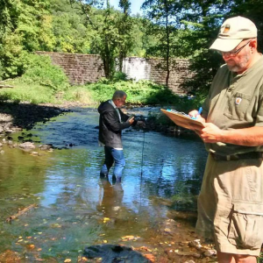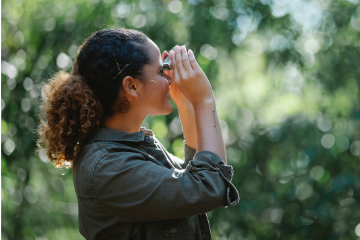 Every year, watershed watchdog Raritan Headwaters Association (RHA) evaluates water quality in dozens of local rivers and streams.
Every year, watershed watchdog Raritan Headwaters Association (RHA) evaluates water quality in dozens of local rivers and streams.
How is this done? With the help of many volunteers!
Raritan Headwaters is seeking volunteer “citizen scientists” for its 2019 stream monitoring season, which will be held the last two weeks of June. Volunteers work in teams – and with RHA staff – to perform visual assessments, biological monitoring, and chemical testing at over 60 stream sites in Hunterdon, Somerset and Morris counties.
“It’s fun, and you don’t need a science degree to volunteer,” said Mara Berezin, watershed scientist at Raritan Headwaters. “We provide volunteers with all the training and equipment they need to become stream monitors.”
A mandatory training session for new volunteers will be held Saturday, May 4, from 9 a.m. to 3 p.m. at RHA’s headquarters, Fairview Farm Wildlife Preserve, located at 2121 Larger Cross Road, Bedminster. The session will consist of both classroom work and in-stream training.
A kick-off event for stream monitors with previous experience will be held from 9 a.m. to noon on Sunday, May 5, and from 1 to 4 p.m. on Wednesday, May 8, also at Fairview Farm. Returning stream monitors will review techniques and equipment, and receive updates from RHA staff about how the stream data they collected is being used to protect water.
To sign up for this free stream monitor training, first fill out a volunteer application then register.
“This is a great volunteer job for people who love the outdoors, nature, and rivers,” said Berezin, who coordinates the stream monitoring project. “Last year we had over 100 trained citizen scientists helping us out, and the data they gathered has really made a difference in helping us analyze the health of the watershed.”
This year, 68 stream sites within the 470-square-mile watershed region will be monitored by RHA. The watershed includes part of 38 municipalities within Hunterdon, Somerset and Morris counties.
In addition to its biological, habitat and chemical monitoring each June, RHA conducts summer bacterial monitoring of impaired sites and swimming holes, quarterly seasonal chemical monitoring of impaired sites, and rapid response to environmental incidents affecting local waterways.
“Monitoring water is a big job and we need the help of dedicated citizens who care about healthy rivers and streams,” said Berezin. Raritan Headwaters issues an annual water quality “report card” based on data collected by stream monitors.
Last year, for the 25th anniversary of the Association’s stream monitoring program, RHA received a Nonprofit Innovation Award from the Sustainable Raritan River Initiative.
Learn more about stream monitoring here. View a map of stream monitoring sites.
About Raritan Headwaters
Raritan Headwaters has been working since 1959 to protect, preserve and improve water quality and other natural resources of the Raritan River headwaters region through efforts in science, education, advocacy, land preservation and stewardship. RHA’s 470-square-mile region provides clean drinking water to 300,000 residents of 38 municipalities in Somerset, Hunterdon and Morris counties and beyond to some 1.5 million homes and businesses in New Jersey’s densely populated urban areas.
Raritan Headwaters recently was accredited by the national Land Trust Accreditation Commission, meaning it has been recognized as a strong and effective organization committed to professional excellence and maintaining the public’s trust.
To learn more about Raritan Headwaters and its programs, please visit www.raritanheadwaters.org or call 908-234-1852.



